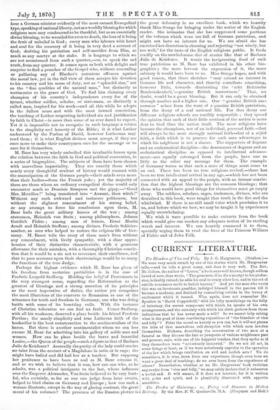CURRENT LITERATURE.
The Blunders of Vice and Folly. By J. G. Hargreaves. (Strahan.)— We were very much struck by one of the stories which Mr. Hargreaves tells,—and he tells a great many, and does it very well. The Rev. Mr. Colton, the author of "Lacon," a book once well known, though seldom heard of now, thus wrote, "The gamester, if he die a martyr to his profes- sion, is doubly ruined; he adds his soul to every other loss, and in the act of suicide renounces earth to forfeit heaven." And yet the man who wrote this was an inveterate gambler, indulged himself in the passion till it became a madness, and finished by committing suicide in the frenzy of excitement which it caused. Who, again, does not remember Mr. Spenlow in "David Copperfield," with his lofty moralizings on the folly of intestacy, the serene composure with which he speaks of his own arrangements, and the certainty with which his clerk gathers from these indications that he has never made a will? So we cannot help asking what is the good of these convincing expositions of "the blunders of vice and folly "? Point the moral as keenly as you can, but it will not pierce the hide of that marvellous self-deception with which men involve themselves. Dickens, describing the conversation of two men at a funeral as they discuss the fate or prospects of various neighbours past and present, says, with one of his happiest touches, that they spoke as if they themselves were "notoriously immortal." Do we not all act, in some things at least, as if we were notoriously superior to the operation of the law which brings retribution on evil and foolish acts ? We do sometimes, it is true, learn from our experience, though even here we want a great deal of teaching ; do we ever learn from the experience of others ? Nevertheless, whether or no Mr. Hargreaves' book reclaims any reader from ' vice and folly," we may safely declare that it subserves a useful end. It will amuse, if it does not interest, for it is written






























 Previous page
Previous page